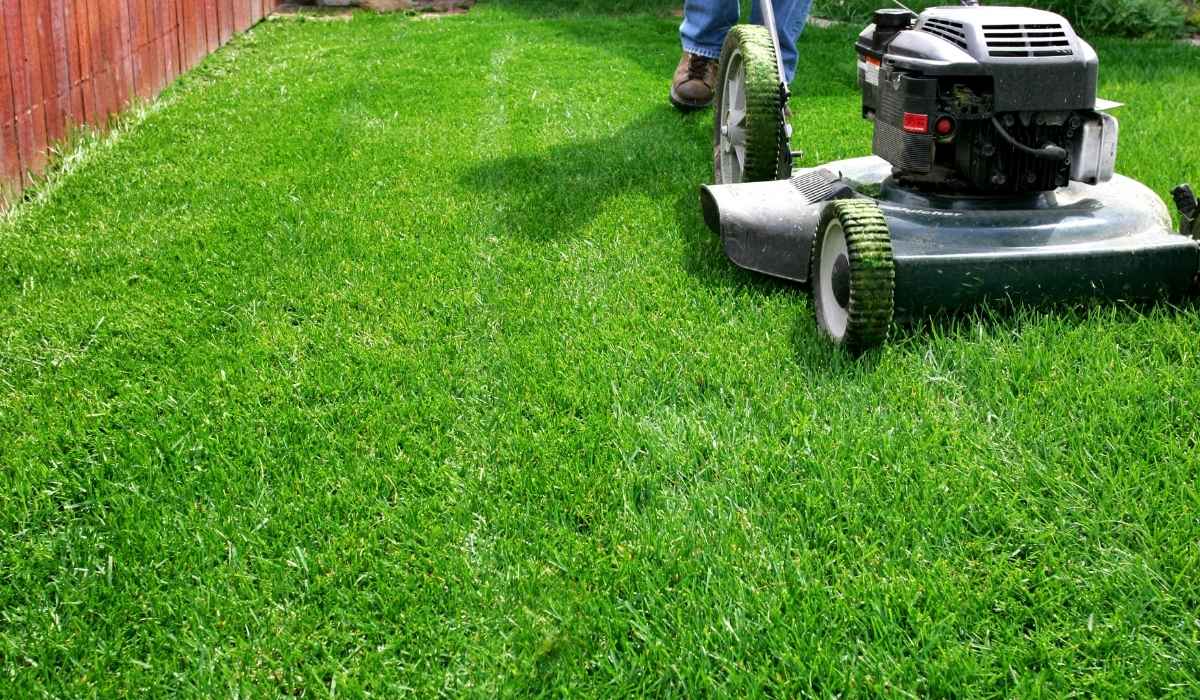
Maintaining a lush, green lawn goes far beyond watering and fertilizing.
One of the most overlooked yet critical elements of turf care is mowing, especially when it comes to premium varieties like TifTuf® Bermuda Turf.
At The Turfgrass Group, we understand that proper mowing is an art form—one that must be tailored specifically to the unique growth patterns, environmental needs, and durability of each turfgrass cultivar.
That’s why we’ve developed custom mowing plans specifically designed to maintain the health, appearance, and resilience of TifTuf® Bermuda Turf.
With its unmatched drought tolerance, high wear resistance, and brilliant color retention, TifTuf® Bermuda Turf is quickly becoming the preferred choice for homeowners, sports fields, golf courses, and municipalities alike.
However, to unlock its full potential, a structured mowing plan is essential.
In this article, we’ll walk you through our customized mowing strategy and explain how regular, well-timed mowing contributes to the long-term health and aesthetics of your TifTuf® lawn.
Understanding the Unique Needs of TifTuf® Bermuda Turf
TifTuf® Bermuda Turf was developed at the University of Georgia as part of a two-decade research initiative aimed at producing a high-performance, water-efficient turfgrass.
Unlike other Bermudagrass varieties, TifTuf® is genetically engineered to maintain vibrant green color with 38% less water and exceptional recovery from wear and tear.
But despite its many advantages, even the best turf can underperform without proper mowing.
TifTuf® grows quickly and vigorously in full sunlight, especially in the warm growing season.
That means mowing is not just a routine task—it’s a vital process that determines the thickness, resilience, and visual appeal of the turf.
Why Custom Mowing Matters

Turfgrass mowing isn’t one-size-fits-all.
Each lawn has its own microclimate, usage patterns, soil type, and irrigation setup.
Therefore, generic mowing schedules often fail to consider the nuanced needs of a specialized cultivar like TifTuf® Bermuda Turf.
Our custom mowing plans are based on:
- Growth rate and seasonality
- Blade sharpness and mower type
- Height-of-cut (HOC) preferences
- Lawn usage (residential vs. sports field)
- Sunlight exposure and regional climate
- Disease and pest pressure
By customizing your mowing schedule based on these variables, we ensure optimal turf health and a consistently beautiful lawn year-round.
The Basics: Mowing Frequency
The frequency of mowing is one of the most critical elements of our custom plan. For TifTuf® Bermuda Turf, we recommend:
- Spring (March–May): Mow every 7–10 days as the turf exits dormancy.
- Summer (June–August): Increase frequency to every 3–5 days due to peak growth.
- Fall (September–October): Return to every 7–10 days as growth slows.
- Winter (November–February): Only mow as needed or not at all during dormancy.
Frequent mowing encourages lateral growth, which helps TifTuf® fill in more densely, increasing its resistance to weeds and thinning.
Ideal Height-of-Cut (HOC)
The HOC is where most homeowners make critical mistakes.
Cutting too short stresses the turf, while cutting too high invites scalping and fungal issues.
Our recommended mowing height for TifTuf® Bermuda Turf is:
- 0.5” to 1.5” for reel mowers (golf course or sports turf)
- 1.0” to 2.0” for rotary mowers (residential lawns)
The “one-third rule” should always apply: Never remove more than one-third of the grass blade in a single mowing session.
This reduces shock and helps retain moisture, particularly important during hot summer months.
Equipment Matters: Choosing the Right Mower
TifTuf® Bermuda Turf performs best when mowed with the correct equipment. We generally recommend:
- Reel mowers for ultra-fine cuts and high-end applications like putting greens or manicured lawns
- Rotary mowers with sharp blades for standard residential use
Sharpen mower blades regularly (at least twice per growing season) to prevent tearing and shredding the grass, which can lead to disease and browning.
Mulching vs. Bagging: Which Is Better?
One common question we receive from clients is whether to mulch or bag clippings. Our answer: Mulch, unless disease is present.
Mulching returns valuable nutrients and organic matter to the soil, which enhances microbial activity and improves soil health.
TifTuf® responds especially well to mulching, provided the clippings are small and evenly distributed.
However, if you notice signs of fungal disease, it may be better to bag clippings temporarily until the issue is resolved, to avoid spreading spores.
Seasonal Adjustments for Maximum Health
Mowing strategies must adapt with the seasons to maintain the strength and beauty of TifTuf® Bermuda Turf.
Spring
- Begin mowing as soon as new green shoots appear.
- Lower your mower slightly to remove dormant tissue and stimulate new growth.
Summer
- Maintain your preferred height-of-cut.
- Mow more frequently to avoid scalping and heat stress.
- Monitor for signs of heat stress and raise HOC slightly during extreme temperatures.
Fall
- Gradually raise the HOC to help the turf store energy before dormancy.
- Decrease mowing frequency as growth slows.
Winter
- Avoid mowing unless turf actively grows during a warm spell.
- Do not scalp the lawn in winter, as this can expose crowns to freeze damage.
Mowing and Irrigation: A Critical Partnership
Mowing and irrigation go hand in hand.
TifTuf® Bermuda Turf requires 38% less water than other Bermudagrass varieties, but when and how you water still impacts mowing results.
Tips for synchronizing mowing with irrigation:
- Avoid mowing when the lawn is wet to prevent compaction and mower ruts.
- Schedule irrigation early in the morning to allow turf to dry before mowing.
- Adjust irrigation duration based on the season and your mowing height.
Avoiding Common Mowing Mistakes
Even with the best intentions, improper mowing can undermine your lawn’s potential. Here are the top mistakes we help our clients avoid:
- Scalping – Cutting too short, especially on uneven terrain.
- Infrequent mowing – Letting grass grow too long between cuts stresses the plant.
- Dull blades – Torn blades lead to browning and increased disease risk.
- Cutting wet grass – Leads to clumping, uneven mowing, and soil compaction.
- Neglecting edge trimming – Overgrown edges can spoil an otherwise pristine lawn.
With our professional mowing plans, these risks are proactively managed for consistently high-quality results.
Professional Lawn Care Support
Not everyone has the time, tools, or expertise to implement a proper mowing schedule—and that’s where our team comes in. We offer:
- Customized lawn care consultations
- Ongoing mowing services
- Soil testing and turf analysis
- Fertilization and irrigation integration
Our mowing specialists are trained specifically in the management of elite varieties like TifTuf® Bermuda Turf, ensuring your lawn receives expert-level attention from start to finish.
Why Trust The Turfgrass Group
As the licensed distributor of elite turfgrass cultivars, we are more than just grass suppliers—we are turfcare innovators.
When you partner with us, you benefit from our decades of research, advanced technology, and commitment to sustainability.
TifTuf® Bermuda Turf is a result of this innovation. And with our custom mowing plans, you can be confident that you’re supporting its health, maximizing its performance, and protecting your investment.
Final Thoughts
A vibrant, weed-free lawn doesn’t happen by accident.
For premium turf varieties like TifTuf® Bermuda Turf, success lies in consistent, strategic care—especially when it comes to mowing.
From the timing and frequency to blade sharpness and mowing height, every detail matters.
By investing in a custom mowing plan, you’re not just maintaining your lawn—you’re optimizing it for beauty, resilience, and long-term health.
Let The Turfgrass Group guide you toward a greener future with tailored solutions that work with nature, not against it.
Call to Action
The Turfgrass Group is the premier source for exclusive turfgrass cultivars at the cutting edge of turfgrass technology and engineering.
Through alliances with the private sector and university breeding program, The Turfgrass Group licenses the production of one of the finest collections of superior “value-added” turfgrass varieties available in the world.
👉 For Homeowners:
Want to learn more about our premium turfgrass varieties and connect with a trusted local grower in your area?
Click below to find a grower near you!
👉 For Industry Professionals:
Interested in becoming a licensed, certified grower of The Turfgrass Group’s elite turfgrass varieties? Join our mission of excellence and innovation in turfgrass cultivation.
Click below to get started!
FAQs
Why is mowing important for TifTuf® Bermuda Turf?
Mowing is essential for maintaining the density, color, and overall health of TifTuf® Bermuda Turf. Regular mowing encourages lateral growth, improves turf thickness, and reduces weed invasion. It also ensures that the turf develops a uniform and visually appealing surface.
How often should I mow TifTuf® Bermuda Turf?
Mowing frequency depends on the season. During the active growing season (late spring and summer), TifTuf® Bermuda Turf should be mowed every 3–5 days. In cooler months or during dormancy, mowing can be reduced or stopped altogether.
What is the ideal mowing height for TifTuf® Bermuda Turf?
For reel mowers, maintain a height of 0.5” to 1.5”. For rotary mowers, aim for 1.0” to 2.0”. Always follow the “one-third rule,” meaning you should never cut more than one-third of the grass blade at once to avoid stress and promote healthier growth.
Can I use a regular rotary mower on TifTuf® Bermuda Turf?
Yes, you can use a rotary mower, especially for residential lawns. However, it’s important to keep the mower blades sharp and maintain the recommended cutting height. For a cleaner, golf-course-like appearance, a reel mower is preferred.
Should I mulch or bag the grass clippings after mowing?
Mulching is generally recommended for TifTuf® Bermuda Turf as it recycles nutrients and improves soil health. However, if your lawn is experiencing a fungal outbreak or excessive growth, it may be better to bag the clippings temporarily.
What happens if I mow TifTuf® Bermuda Turf too short?
Mowing too short (scalping) can stress the turf, expose the soil to weeds, and increase vulnerability to pests and diseases. Always adhere to the recommended height and avoid removing too much leaf tissue at once.
How does mowing affect the water needs of TifTuf® Bermuda Turf?
Proper mowing supports efficient water use. TifTuf® Bermuda Turf is known for its excellent drought tolerance, requiring 38% less water than other Bermudagrass varieties. Keeping the turf at the right height helps retain moisture and enhances drought resistance.